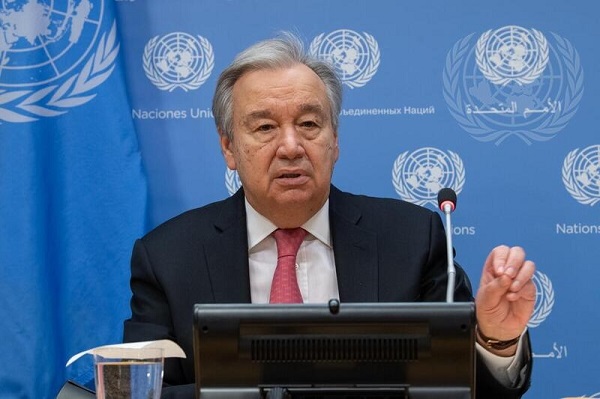United Nations, (Asian independent) UN Secretary-General Antonio Guterres has said that next week’s General Debate of the General Assembly must be about hope.
“This year’s General Debate must be about providing hope and overcoming the divisions that are dramatically impacting the world,” he told a press conference on Wednesday ahead of the high-level week of this year’s General Assembly session.
“That hope can only come through the dialogue and debate that are the beating heart of the UN and that must prevail next week against all divisions,” he added.
People need to see results in their everyday lives, or they will lose faith in their governments and institutions, and they will lose hope in the future, he warned.
Guterres said his opening speech on Tuesday to the General Debate will address the urgent issues with concrete recommendations and a call to action, Xinhua news agency reported.
“As fractures deepen and trust evaporates, we need to come together around solutions,” he added.
The General Assembly is meeting at a time of great peril. Geostrategic divides are the widest they have been since at least the Cold War. They are paralysing the global response to the dramatic challenges the world faces, he said.
“Our world is blighted by war, battered by climate chaos, scarred by hate, and shamed by poverty, hunger, and inequality.”
Conflicts and unrest continue to rage. The conflict in Ukraine is devastating a country and dragging down the global economy. Global hunger began to rise before the Covid-19 pandemic and has never recovered. The cost-of-living crisis is hitting the poorest people and communities hardest, with dramatic effects. The rights of women and girls are going into reverse. Most developing countries have no fiscal space, and no access to the financial resources needed to recover from the pandemic and protect their people from the devastating impact of climate change, he noted.
“The solidarity envisioned in the UN Charter is being devoured by the acids of nationalism and self-interest — by a shocking disregard for the poorest and most vulnerable in our world; by politicians who play to people’s worst instincts for partisan gain; by prejudice, discrimination, misinformation and hate speech that pit people against one another; by a global financial system that penalises those with the least; by fossil fuel corporations killing the planet to rake in the most,” said the UN chief.
Guterres said he was shocked by the destruction caused by floods in Pakistan during his recent trip, and called for climate action.
What is happening in Pakistan demonstrates the sheer inadequacy of the global response to the climate crisis, and the betrayal and injustice at the heart of it, he said.
“Whether it is Pakistan, the Horn of Africa, the Sahel, small islands or least developed countries, the world’s most vulnerable, who did nothing to cause this crisis, are paying a horrific price for decades of intransigence by big emitters.”
The Group of 20 (G20) countries are responsible for 80 per cent of emissions. They are also suffering the impact of record droughts, fires and floods. But climate action seems to be flatlining. If one-third of G20 countries were under water today — as it could be tomorrow — perhaps they would find it easier to agree on drastic cuts to emissions, the UN chief added.
All countries — with the G20 leading the way — must boost their national emissions reduction and must limit the world’s temperature rise to 1.5 degrees. Pakistan and other climate hot spots need flood-resilient infrastructure now. And those most responsible for emissions must step up with the funds for adaptation, he said.
At least half of all climate finance and climate resilience should go to adaptation so as to protect people and economies. Unless action is taken now, unless funds are disbursed now, these tragedies will simply multiply, with devastating consequences for years to come, including instability and mass migration around the world, he warned.
“So my message to world leaders gathering here (for the General Debate) is clear: Lower the temperature — now. Don’t flood the world today; don’t drown it tomorrow,” said Guterres.








